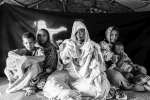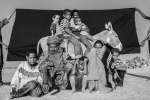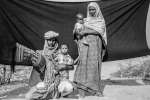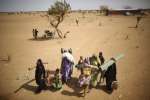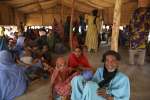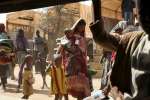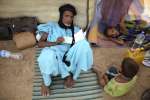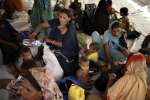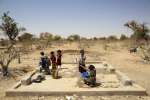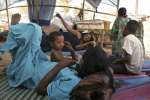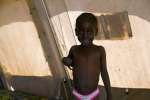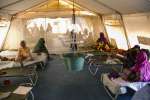- Text size
 |
|  |
|  |
| 
- عربي
Birth certificates issued by Mali open doors for Mauritanian refugee children
News Stories, 20 April 2015
KAYES, Mali, April 20 (UNHCR)A quarter century after his grandfather fled from Mauritania to escape bitter inter-communal violence, 13-year-old Oumar stood with other young Mauritanian refugees to receive birth certificates in Mali – a step that opens the door to basic rights enjoyed by Malians.
"Feel at home in Kayes, you are at home in Mali," Minister for Territorial Administration and Decentralization Abdoulaye Idrissa Maïga told the 32 children at the March ceremony held close to the Mauritanian border that their parents had once fled across. Their births had never been registered, hindering access to basic social services.
Overall, 7,807 Mauritanian refugee children born in Mali will receive the document, which establishes their identity and is a requirement when applying for naturalization in Mali. Birth certificates also facilitate access to state services, in particular education.
Oumar is the grandson of a Mauritanian refugee who found safety in Mali after inter-community violence broke out in Mauritania. In 1990, his grandfather and grandmother and their young ethnic Fulani family were warmly welcomed to Seinkolé. They have lived at the site, near Kayes, ever since.
"My top priority is their education. I do not want my children to suffer as much as I did myself," said Oumar's father, 36-year-old Amadou, whose own education ended abruptly when his family fled to Mali. Nearly 13,000 Mauritanians live in Mali today in 51 sites near Kayes, most of them after fleeing the violence that shook their country 25 years ago.
The young Oumar is curious and his eyes bright. During breaks at school he prefers to write rather than play football with his schoolmates. He dreams of becoming a teacher in order to share what he is learning with other children.
Oumar is one of 23 children out of 130 school-age refugee children of Seinkolé given places in the Wali Kompe Diawara school last November, thanks to the support of UNHCR, its operational partners and Flany Cissé, the director of the school.
With two teachers – and a third soon to come – there is an effort to encourage parents to enrol children, particularly girls. Cissé says it was initially difficult to have the local community accept Mauritanian children at school, but gradually everyone understood the advantage of living together peacefully.
The refugee children have limited understanding of Soninke, Bambara or French, the most common languages in the region. Despite that barrier, Cissé is optimistic as children are learning French at the school.
In July last year, the Mali government committed itself to helping all Mauritanian refugees who wished to integrate locally. The presentation of a birth certificate to Oumar last month came only days after a declaration of intention by Mali at a meeting between UNHCR and ministers from the Economic Community of West African States (ECOWAS) to facilitate the naturalization of Mauritanian refugees.
Because the refugees face problems relating to nationality, this also supports UNHCR´s global #IBelong campaign to eradicate statelessness by 2024.
Mali also declared its intention to accede to the 1954 Convention relating to the Status of Stateless Persons and the 1961 Convention on the Reduction of Statelessness, and it has started the process.
Mali's steps toward local integration of Mauritanian refugees, including issuance of birth certificates, will transform the lives of these children. Oumar and others like him will now find it easier to gain an education and contribute to the social and economic health of the region. They will be able to access public services, sign contracts for work, buy and sell land, set up companies and borrow from banks. They can now plan a future.
By Kelly Sipp and Isabelle Michal in Kayes, Mali




